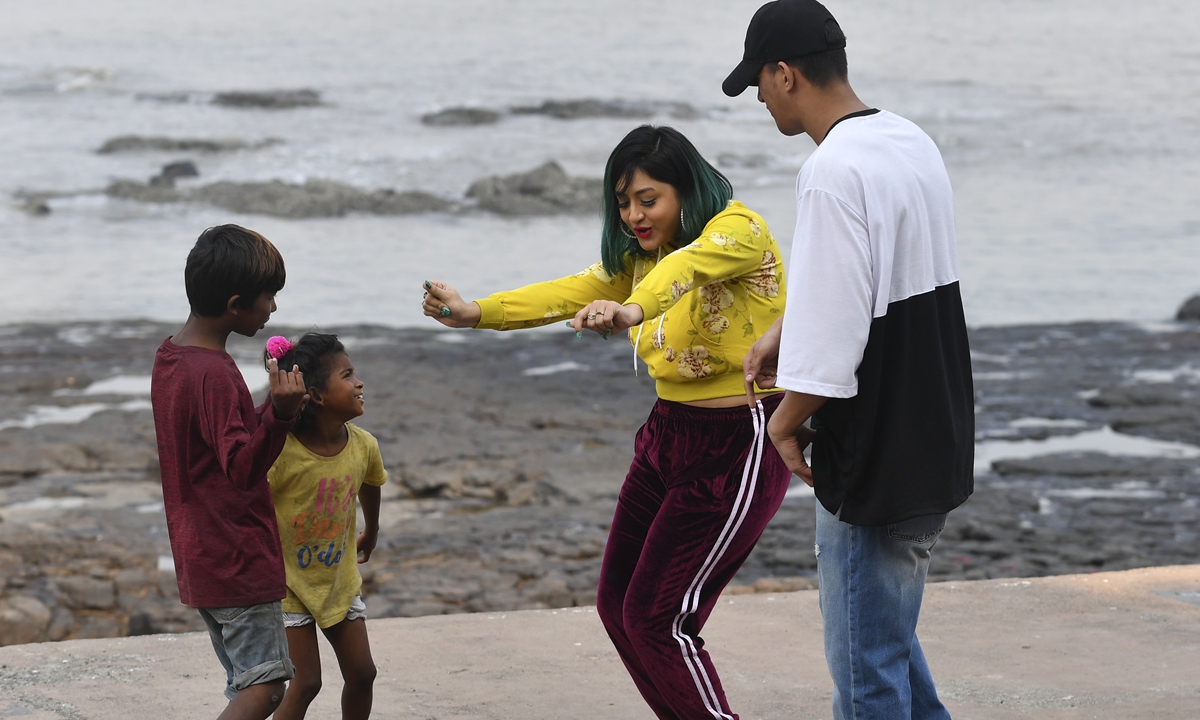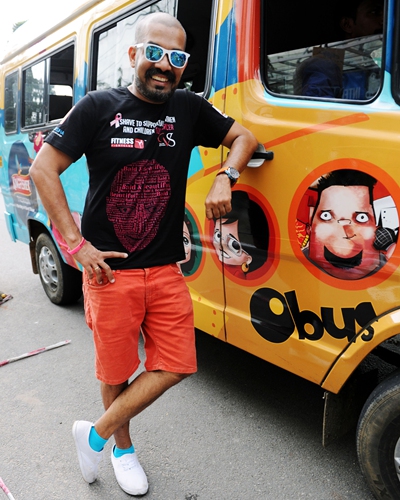Independent musicians thrive as pandemic silences Bollywood
Source: AFP Published: 2020/12/8 18:33:40

Indian hip-hop artist Palak Parnoor Kaur (second from right) records a music video in Mumbai on November 3. Photo: AFP

Musician Carlton Braganza poses for a picture by his Obus Bus in Bengaluru, India on September 9, 2015. Photo: AFP
Bollywood movie songs normally dominate India's music charts. But when the coronavirus epidemic put paid to new film releases, it created a huge opportunity for independent musicians to make a name for themselves - sometimes from their bedrooms.
Singer Carlton Braganza saw his popularity skyrocket when the country went into lockdown in March, and his phone is now ringing almost non-stop with offers from agents.
For more than three months, the 48-year-old spent nights performing for an online audience from his small bedroom, gaining tens of thousands of new fans in the process.
"I performed live every night for 70 days on Facebook, taking audience requests," the Bangalore-based musician told AFP.
He has clocked up to 1.5 million views on Facebook, with around 125 online shows under his belt.
His free performances are now paying off, with private bookings and venues lining up as restrictions loosen.
Experienced musicians like Braganza are not the only ones profiting from the pandemic-induced vacuum in India's entertainment calendar.
Hip-hop artist Palak Parnoor Kaur, who has used a GoPro to shoot videos inside rickshaws and buses under the moniker "Lil Malai" ("Lil Cream") since 2018, has also seen an uptick in followers.
Her videos focusing on India's millennials and the issues that trouble them struck a chord with young audiences on Instagram and YouTube, with fans praising her for tackling difficult subjects like gender violence.
"Independent artists fill the empty spot created by Bollywood music with original and organic content that audiences can relate to. Now they are more aware of our existence," the Mumbai-based Kaur told AFP.
Data from audio streaming platform JioSaavn reveals the sea change that has taken place, with their Top 30 weekly chart dominated by non-film music since the lockdown.
Until mid-October, the top five songs streamed in India were all non-film tracks, according to the platform.
The expansion of independent music labels such as the US-based CD Baby and Tunecore into India has made it easier for musicians to release albums online.
But experts caution that it is only a matter of time before Bollywood claws its way back into the spotlight.
"Once movies start, audiences might just go back to Bollywood music and non-film numbers will tank," Priyak Dhar, editor of MusicPlus.com, told AFP.
Many artists are still struggling to make money, despite acquiring social media followers, said Atul Churamani, managing director of music publishing firm Turnkey.
"Although artists have started online concerts, most of them are free," Churamani told AFP.
"With coronavirus-led lockdowns, even if artists have views and a huge fan following, there are no offline gigs and hence no revenue."
But for some, money isn't the main motivation behind their desire to grab the mic.
Rapper Duleshwar Tandi's furious videos about the plight of migrant workers in India's lockdown went viral in April, bringing the former waiter unexpected fame.
The videos, shot on a mobile phone in his village, attacked the government for its apathy toward the poor.
"When the lockdown was imposed, my family almost starved as there was no work or money," said the 27-year-old, who raps under the pseudonym Dule Rocker.
"I started rapping to channel my anger with the governmental system and everyone responded strongly."
He has rejected offers from the film industry, telling AFP he refuses "to write rap music objectifying women."
But in a story arc worthy of a Bollywood movie, he is now working on an album for US titan Universal Group Music.
"I want to bring changes to how society looks at poverty," he said.
Newspaper headline: Filling a space
Posted in: MUSIC,CULTURE & LEISURE